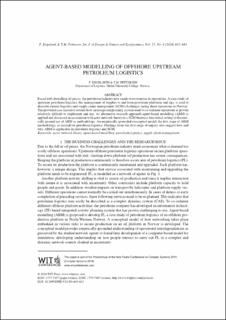Agent-based modelling of offshore upstream petroleum logistics
Peer reviewed, Journal article
Published version

Åpne
Permanent lenke
https://hdl.handle.net/11250/3050588Utgivelsesdato
2016Metadata
Vis full innførselSamlinger
- Artikler [388]
- Publikasjoner fra Cristin [404]
Originalversjon
International Journal of Design & Nature and Ecodynamics. 2016, 11 (4), 635-643. 10.2495/DNE-V11-N4-635-643Sammendrag
Faced with dwindling oil prices, the petroleum industry now needs to economize its operations. A case study of upstream petroleum logistics, the management of supplies to and from petroleum platforms and rigs, is used to describe current logistics and supply chain management (SCM) challenges facing these operations in Norway. The provided case narrative reveals how an integrated planning system used to co-ordinate operations is proven relatively difficult to implement and use. As alternative research approach agent-based modelling (ABM) is applied and discussed in association with actor network theory in a SCM business-functional setting to theoretically ground use of ABM as methodology. An empirically-grounded conceptual model, the first stage of ABM methodology, is created for petroleum logistics. Findings from this first stage of inquiry also suggest how and why ABM is applicable in petroleum logistics and SCM. Keywords: actor network theory, agent-based modelling, petroleum logistics, supply chain management.